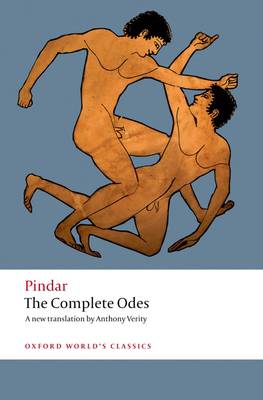
- Retrait gratuit dans votre magasin Club
- 7.000.000 titres dans notre catalogue
- Payer en toute sécurité
- Toujours un magasin près de chez vous
- Retrait gratuit dans votre magasin Club
- 7.000.0000 titres dans notre catalogue
- Payer en toute sécurité
- Toujours un magasin près de chez vous
18,45 €
+ 36 points
Description
The Greek poet Pindar (c. 518-428 BC) composed victory odes for winners in the ancient Games, including the Olympics. He celebrated the victories of athletes competing in foot races, horse races, boxing, wrestling, all-in fighting and the pentathlon, and his Odes are fascinating not only for their poetic qualities, but for what they tell us about the Games. Pindar praises the victor by comparing him to mythical heroes and the gods, but also reminds the athlete of his human limitations. The Odes contain versions of some of the best known Greek myths, such as Jason and the Argonauts, and Perseus and Medusa, and are a valuable source for insights on Greek religion and ethics. Pindar's startling use of language, including striking metaphors, bold syntax, and enigmatic expressions, makes reading his poetry a uniquely rewarding experience.
Anthony Verity's lucid translations stay as close as they can to the original Greek, without sacrificing readability. The text is complemented by a succinct introduction by Stephen Instone outlining the essential nature of Pindar's Odes as well as explaining the nature of the Games, the events, and the participants. Explanatory notes help the reader to navigate Pindar's sometimes compressed and allusive expressive technique. About the Series: For over 100 years Oxford World's Classics has made available the broadest spectrum of literature from around the globe. Each affordable volume reflects Oxford's commitment to scholarship, providing the most accurate text plus a wealth of other valuable features, including expert introductions by leading authorities, voluminous notes to clarify the text, up-to-date bibliographies for further study, and much more.
Anthony Verity's lucid translations stay as close as they can to the original Greek, without sacrificing readability. The text is complemented by a succinct introduction by Stephen Instone outlining the essential nature of Pindar's Odes as well as explaining the nature of the Games, the events, and the participants. Explanatory notes help the reader to navigate Pindar's sometimes compressed and allusive expressive technique. About the Series: For over 100 years Oxford World's Classics has made available the broadest spectrum of literature from around the globe. Each affordable volume reflects Oxford's commitment to scholarship, providing the most accurate text plus a wealth of other valuable features, including expert introductions by leading authorities, voluminous notes to clarify the text, up-to-date bibliographies for further study, and much more.
Spécifications
Parties prenantes
- Auteur(s) :
- Traducteur(s):
- Editeur:
Contenu
- Nombre de pages :
- 224
- Langue:
- Anglais
- Collection :
Caractéristiques
- EAN:
- 9780199553907
- Date de parution :
- 15-10-08
- Format:
- Livre broché
- Format numérique:
- Trade paperback (VS)
- Dimensions :
- 127 mm x 193 mm
- Poids :
- 181 g

Les avis
Nous publions uniquement les avis qui respectent les conditions requises. Consultez nos conditions pour les avis.






